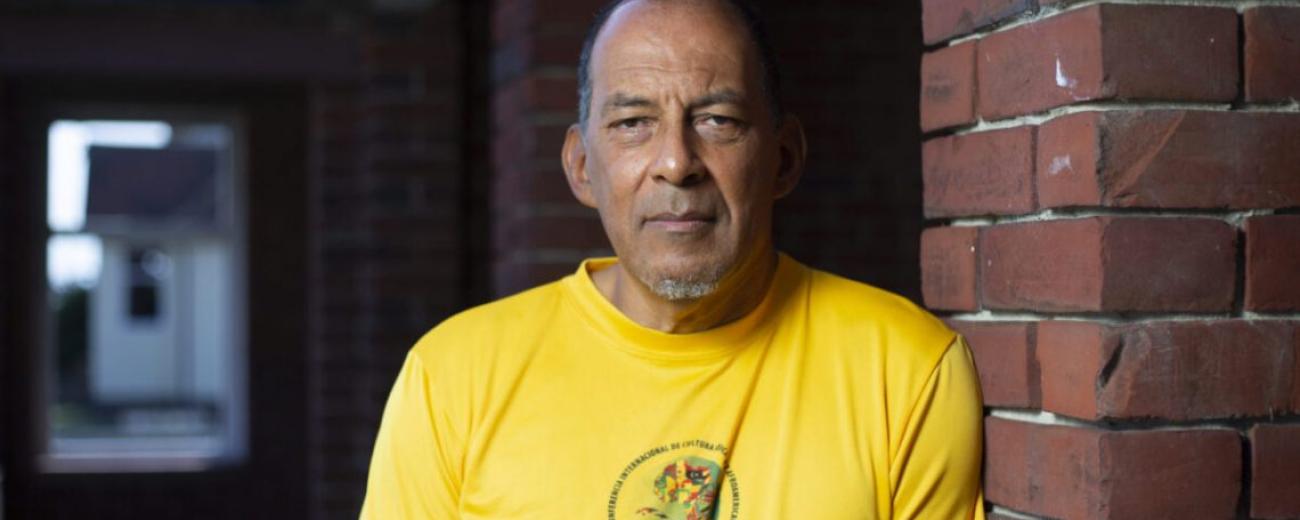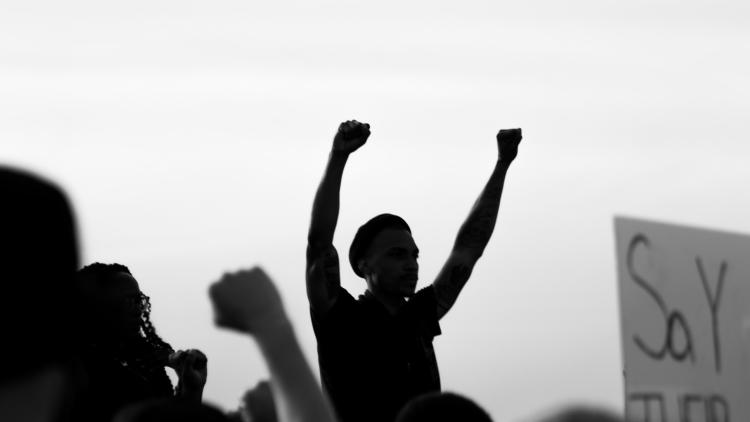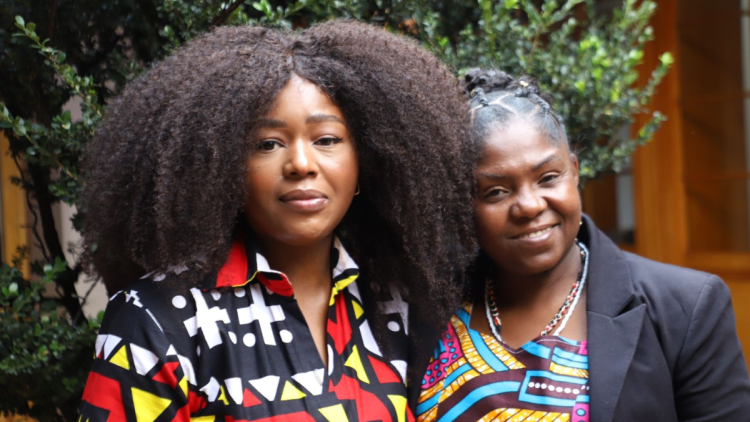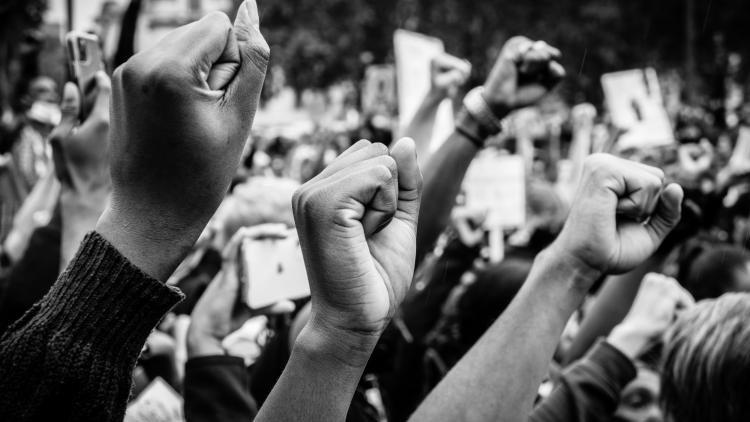Hakim Adi: The history of Africa is integral to the history of the world


SOAS alumnus Hakim Adi is a Professor of History of Africa and the African Diaspora at The University of Chichester and was the first historian of African heritage to become a professor of history in Britain. During Black History Month, he returns to SOAS for the launch of his latest book, African and Caribbean People in Britain: A History. We asked Hakim about his time at SOAS, his experience writing his latest book and any advice he has for students wanting to study African and Caribbean history.
What led you to first study at SOAS? And come back to do your PhD?
I started as an undergraduate at SOAS in 1976. Because I was denied the opportunity to learn anything about the history of Africa at school, I was determined to study it at university so that I could teach the subject to others. At that time, I wanted to be a teacher. As far as I can recall, in those days there were only three universities that provided degrees in African History and SOAS was at the top of my list, it seemed to be the place to be. Those were the days of the pioneering historian Roland Oliver, whose books I’d tried to read as a teenager.
However, I recall that my peers and I thought that the history of Africa that was presented was a very Eurocentric one and we were quite critical of what we were taught. I suppose that we thought that SOAS was very Eurocentric, even African languages were not taught by Africans. Indeed, there were no African teachers at all. I remember how pleasantly shocked and surprised we were when an African American academic made a short visit. We all wanted to meet and speak with her since it was such a rare occurrence, one that was never repeated in the twelve years I spent at SOAS.
In those days it was unheard of for an undergraduate student of African history to be encouraged to study for a PhD, or even for an MA. However, I was fortunate in the sense that I also studied Social Anthropology. In that department, there was a little more encouragement and in my case the opportunity of a studentship to begin studying for an MPhil under the supervision of Prof. Abner Cohen. I began that first PhD in 1979, but things did not work out very well. I didn’t get the encouragement I had expected. I felt that I couldn’t write as I wished, and the department would not upgrade my research to PhD level. As a result, I left after two years and tried to re-establish my career as a school teacher. My career path as a teacher was not a smooth one, and I was initially rejected at all the teacher training institutions, including the Institute of Education. When I eventually qualified, it became apparent that there were very few opportunities to teach African history outside of academia and if I still wanted to teach the subject would have to find a way of taking a PhD.
Even though my experience at SOAS had not been an altogether happy one, I decided to again become a student at the devil I knew, this time in the history department. With the support of Prof Richard Rathbone, I began my second PhD in 1987. I spent the next seven years researching the anti-colonial politics of West African students in Britain and finally received my PhD in 1994. I’m sure that SOAS did change in the twelve years that I spent as a student, but I recall even in the 1990s undergraduates still used to complain that it was very Eurocentric. One very positive feature of my time as an undergraduate was that we studied the history of the entire continent of Africa, from prehistoric times up to the twentieth century. From what I have heard that is no longer the case. In my day, however, not much attention was paid to certain parts of Africa. Ancient Egypt, I seem to recall, was hardly mentioned.
You mentioned your complex feelings when you became the UK’s first Black Professor of History. Do you think enough is being done to support Black academics to progress? What challenges do you think remain?
Above I have described some of the difficulties I have faced in my career, and the many years it took me to gain a PhD, but it soon became evident that I was one of the first to even gain a PhD. My academic career also had its challenges, not least because in Britain there is almost no tradition of researching and teaching the history of Africa and the African diaspora. For many years institutions such as SOAS rejected that approach. I became something of a pioneer, so to speak, and that always has its challenges. Then there are people who deliberately stand in your way. At one stage I had a referee who gave me a negative reference to prevent me from gaining promotion. Who has ever heard of such a thing?! I won’t name him, yet. Then there was somebody at the British Library who decided to secretly write to prevent me from obtaining funding. These are just two minor examples.
It took many years to become a professor, of course, and I always considered that I had taken too long, but then I was told I was the first. Some people see it as a significant achievement, but I looked on it more as an illustration of a problem. Even now there are very few history professors of African heritage and, I believe, I’m still the only one who has climbed up every rung of the education system in this country. So, I think the issue is not just that more support is needed for Black academics but rather that more support is needed for those young people of African and Caribbean heritage who are, at every stage of their education, dissuaded from studying history, not least because it is presented in such a Eurocentric manner in schools and in society at large.
When I became a professor in 2015, history was the third least popular subject of study for undergrads of African and Caribbean heritage. As a result, there were very few post-graduates, very few teachers of history in schools and very few PhD students. When we held the History Matters conference in 2015, there appeared to be only ten Black PhD history students in the entire country. Now I have more than that studying with me at the University of Chichester. In short, there is still a long way to go. Those who are in a position to do so need to aid those who are trying to move forward. In my view, there are many who describe the problem but few who do anything to solve it.
Your new book African and Caribbean People in Britain dispels the ‘Windrush myth’, looking at the long history of African and Caribbean people in this country. What was your experience like writing it?
Writing books is always difficult and, as this one covers thousands of years, it was quite a challenge. My main aim was to try to summarise and present in an accessible way all the research that has been done over the past forty years both for students as well as for the general reader. I hope it’s a useful resource. Writing for me is always difficult because I have to teach and have many other responsibilities, so it’s always a question of finding time and maintaining focus and discipline.
How do you combine your academic work with your activism in the community?
I have no alternative. Unfortunately, we live in a world, a society, that is in constant crisis, full of problems to be solved. The fact that education isn’t free in this country is a big problem, so too the problem of racism and Eurocentrism, now the threat of nuclear war and environmental disaster hangs over us. If you consider that there is something wrong then you have the responsibility to find out exactly what it is and to try do something about it, that’s how it seems to me.
As a founder of the Young Historians Project, what are your continued hopes for the future of this project?
Ultimately you could say that we want to solve particular problems, which are that so few young people of African and Caribbean heritage are engaging with history. Even many of those with good GCSE grades do not go on and take A-level history. Those with good A-level grades don’t study it at university and so on. But then you have to look and see why that is the case. Why is the education system so Eurocentric, why is society so Eurocentric and how can all this be changed? So that is a very big project of which YHP is just a part. There is plenty of work still to be done and obviously not just by YHP.
What advice would you give to students wanting to study the history of Africa and the Caribbean?
They should! It doesn’t need to be studied only at university but also at school and elsewhere. That history also intersects with the history of Britain, as well as with many other countries, so it’s part of world history and there are many different ways of studying that. Most importantly, we are studying history to understand the world in which we live, and why it is the way it is.
It’s surely impossible to understand that world without studying Africa, the continent that gave birth to humanity, and produced important developments in food production, the emergence of states, various scientific developments and so on. But then it is impossible to understand the modern world without knowing the role of Africa and the Caribbean in the development of Britain. There could not be a modern Britain, a Great Britain, as it’s called, without the contribution of Africa and the Caribbean. What is important is to understand the relationship which has existed between these three areas.
Just to give one topical example, the monarchy has been central to the modern relationship between Britain, the Caribbean and Africa. From Elizabeth Tudor to William Hanover, all the monarchs played a leading role in the human trafficking of African, men, women and children. That great crime was for many years a royal monopoly headed by the monarchy. When they were efforts to abolish this great crime, the monarchy advocated that it should be continued. If we understand all that it perhaps gives us the ability to place the role of the monarchy in some historical context.
Disclaimer: All views and opinions expressed on the SOAS Blog are those of the authors and do not necessarily reflect the official policy or position of SOAS University of London.


